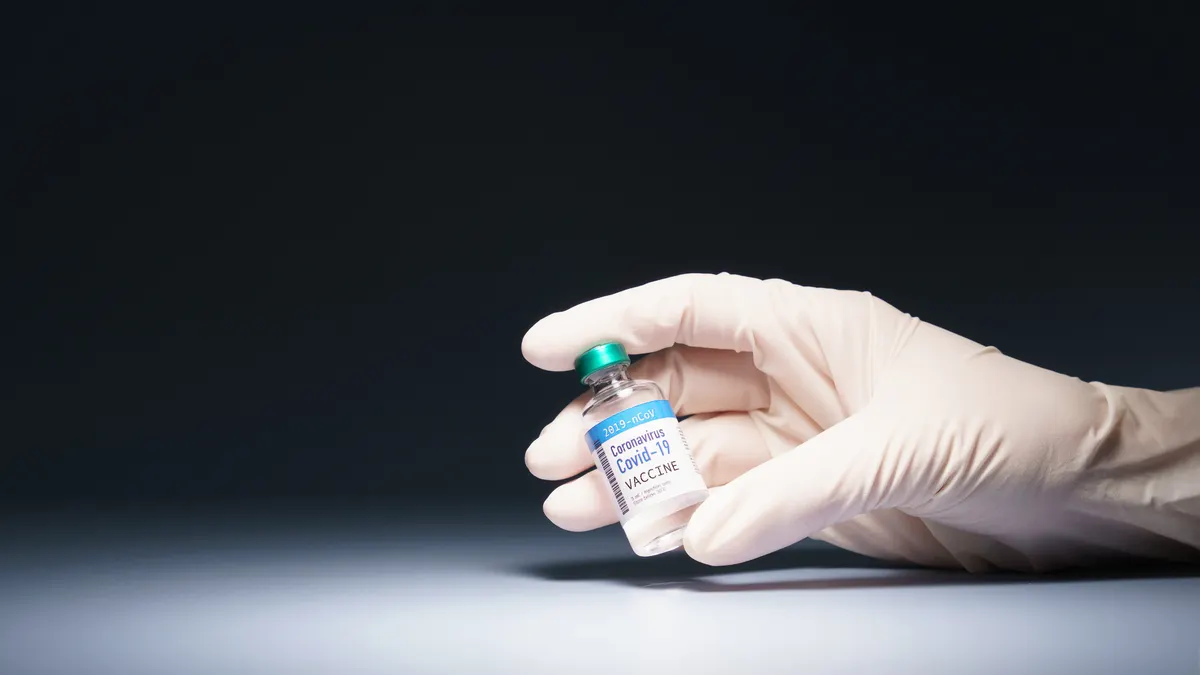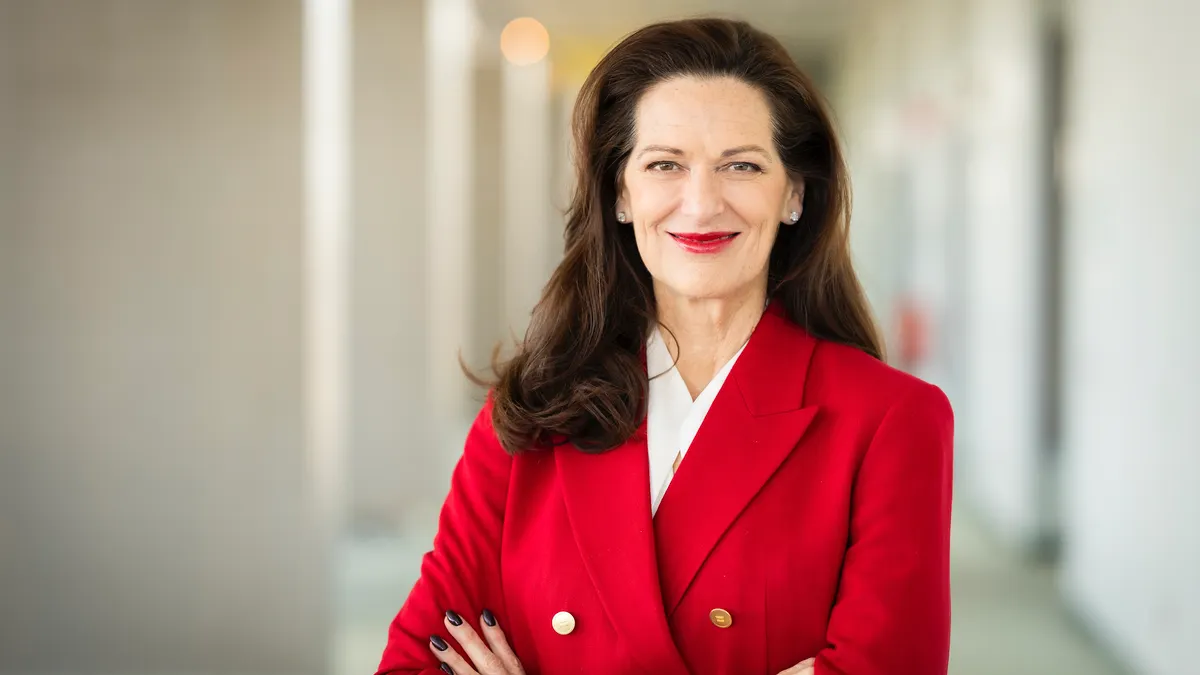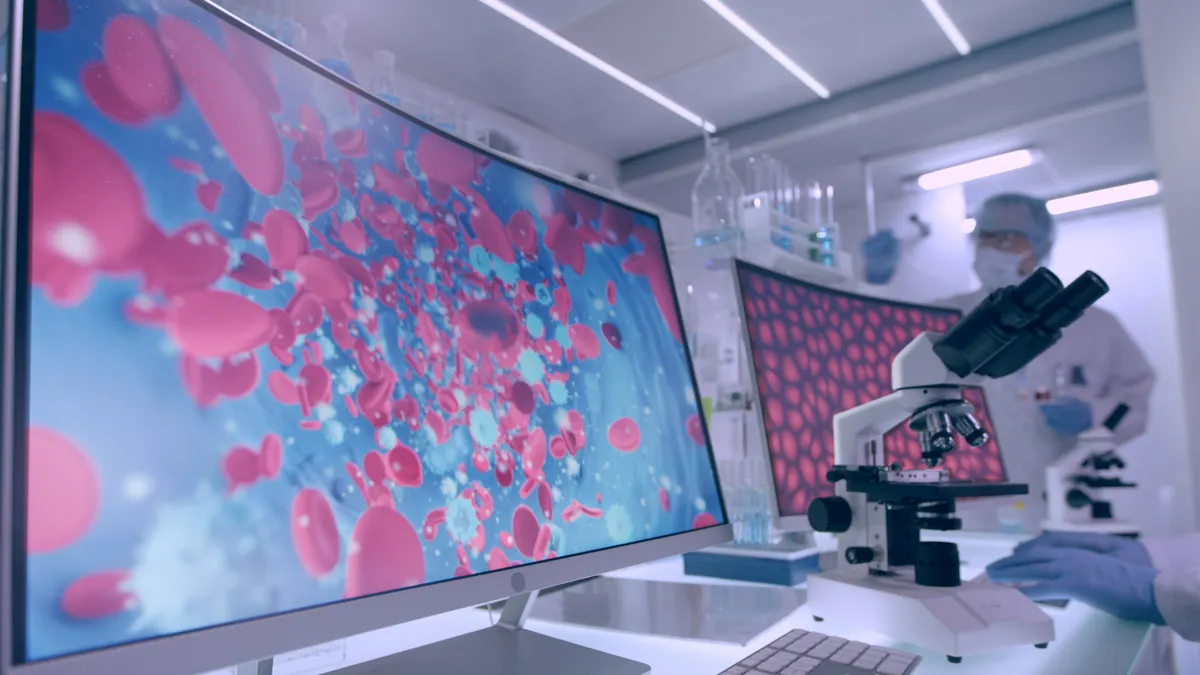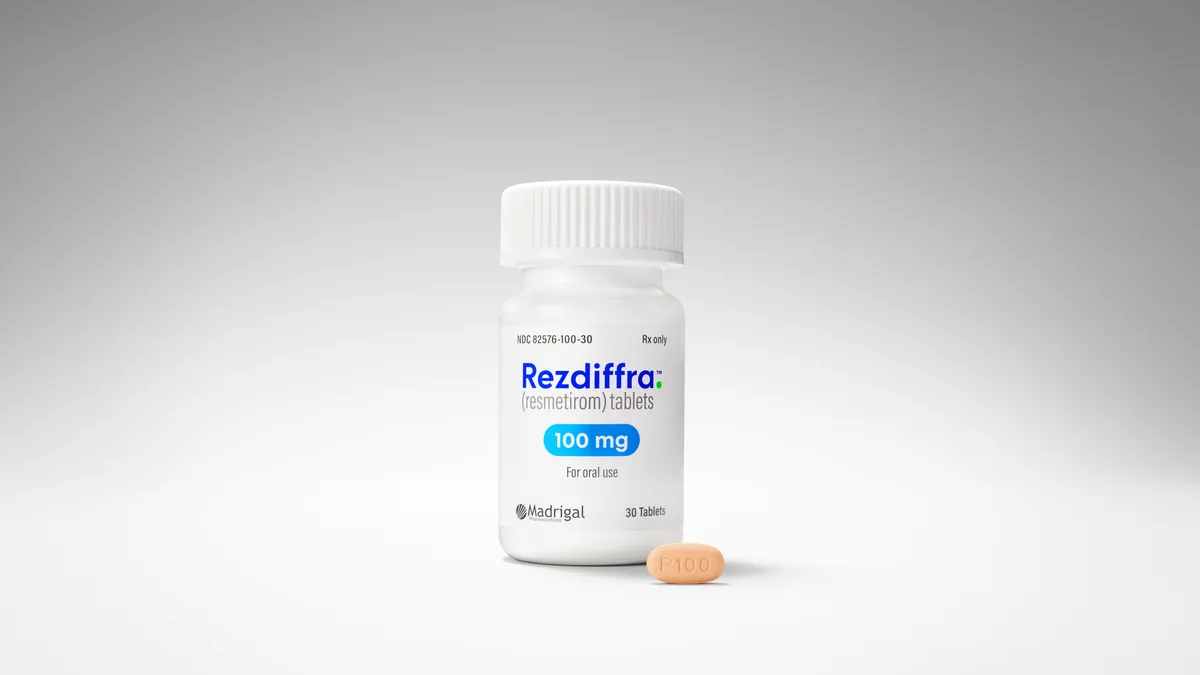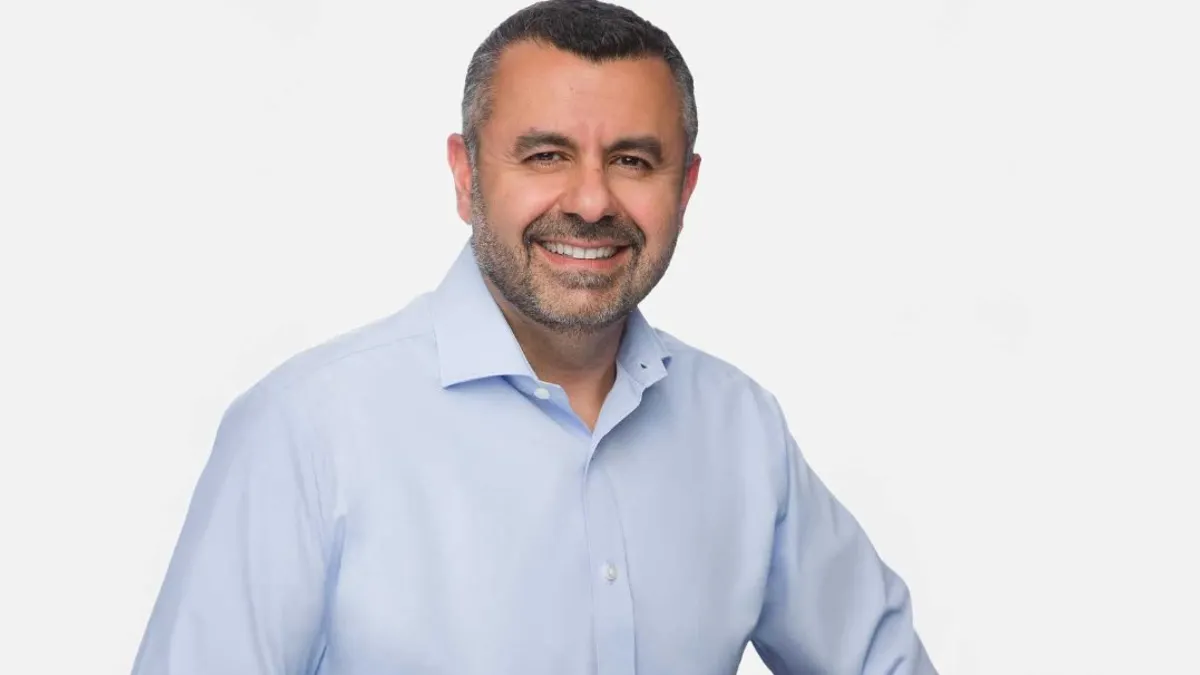Nikolaus Friedreich is “definitely dead.” And he has been since 1882.
At least, that’s what his gravestone says at the beginning of “Friedreich’s Back,” a marketing campaign for the drug Skyclarys, Biogen’s treatment for the ultra-rare genetic condition, Friedreich ataxia.
But when Friedreich’s corpse reaches a hand up out of the ground, zombie-movie style, the ad takes a turn. He sits up — wearing his burial finest, covered in dirt, with a pale, post-death pallor — and looks around the quiet graveyard. He’s not only shocked to discover that he’s dead, but is amazed that a disease has been named after him: Friedreich ataxia, which he discovered.
“Oh my God!” he cries in a German accent, still-waist deep in his grave. “They named a disease after me! Oh, no!”
What comes next is a darkly funny, nine-episode web series that follows Friedreich as he becomes Biogen’s newest intern, working with a Skyclarys scientist and struggling to navigate the modern world.
On the surface, this approach to drug marketing t sounds like a risk. Maybe even absurd. FA is an ultra-rare disease, affecting about 5,000 people in the U.S. and 15,000 people worldwide, and it’s terminal. The progressive disease damages the nervous system and impacts muscle control, triggering an average lifespan of just 37 years old. There’s really nothing funny about it.
But the campaign’s numbers tell a different story. All told, “Friedreich’s Back” racked up more than 2 million social views within its first three weeks of dropping, according to 21GRAMS, the ad agency behind the “Friedreich’s Back” campaign. After just three months, the videos hit 10 million views on Meta and TikTok, which is roughly 600 times the size of the entire patient population. It also drove more than 5,000 conversions to the Skyclarys website during that time, which is astonishing considering the total U.S. patient population is just 5,000. And the campaign took home the Gold Lion award at the Cannes Lion Festival of Creativity in France last week.
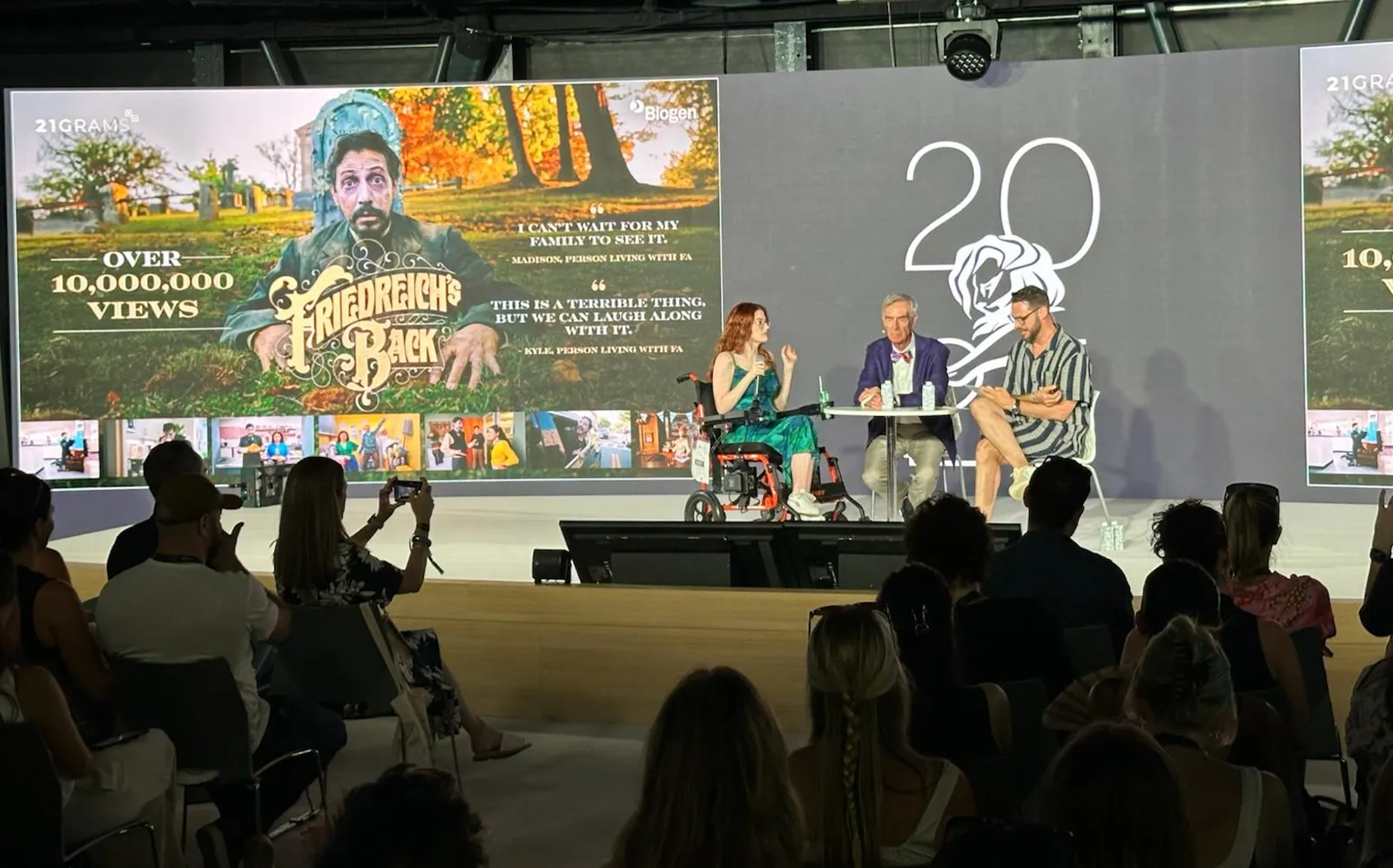
The campaign’s success and resonance is a testament to the industry’s oft-discussed ethos of incorporating patient voices and experiences into pharma strategies. It also showcases the power of laughter even — and maybe especially — in the face of tragedy.
The spark for the campaign came from Fiona Cauley, a standup comedian and FA patient whose act often centers around her experience with the disease.
“The critical insight came when I heard [Cauley] say, ‘I laugh because I've cried enough,’” said Sundip Raval, vice president and head of marketing of rare disease for Biogen. “That was, for me, the moment the penny dropped … We started asking each other, ‘Could we use humor and laughter as a way to bring a community together and discuss the toughest of topics?’”
In talking with patients, the company further discovered that many appreciated and used dark humor to cope with and make light of living with a progressive and deadly neurodegenerative disease.
“The more people we spoke to in the community, it started to become more clear they wanted to laugh. And this was a way of connecting,” Raval said.
Suddenly the “risk” of using humor in a campaign for a drug that treats a terminal disease didn’t seem too risky anymore.
“We knew what they liked, we knew what they wanted, and we knew what kind of content that they loved,” Raval said.
Laughter as a KPI
There’s data to back up the power of humor in advertising. 21GRAMS released a white paper arguing that humor is not only underused in pharma advertising but that laughter can actually be a KPI. Research showed that the overwhelming consumer response to pharma ads is either “neutrality” or “sadness,” which doesn’t elicit either connection or action. Humor, on the other hand, forges connection, captures attention, drives action and is more memorable.
Despite these insights, there’s not a lot of humor in pharma advertising, said Christopher Charles, executive creative director at 21GRAMS.
“And when there is, we're going to be honest, it's not the greatest,” Charles said. “They're really missing the mark because they think they're funny. And that's the worst — when you think you're funny and you're not.”
Charles and Cauley, along with Bill Nye the Science Guy, took to the main stage at Cannes last week to talk about the campaign and the power of using humor in pharma advertising, making Biogen the only pharma campaign presented on the main stage.
In addition to being funny, campaigns like Biogen’s need to be based on a deep connection with the patient community.
“We have done deep ethnographic research where we get to sit side by side with these people for an extended period of time. So we understand what their daily lives are like and what motivates them, what inspires them, what brings them hope and joy, as a way to connect,” Raval said.
Biogen also worked closely with Friedreich’s Ataxia Research Alliance to ensure that the spot hit the right note.
“They too, saw this as a hopeful and inspiring way to bring light to a difficult situation,” Raval said.
Moving ahead in rare disease
Biogen acquired Reata Pharmaceuticals in September 2023, along with Skyclarys, shortly after the drug became the first and only FDA-approved FA treatment for adults and adolescents aged 16 years and older.
Now, it’s part of Biogen’s rare disease portfolio, which also includes programs and commercial assets in ultra-rare forms of ALS and spinal muscular atrophy, Raval said. The company initiated a phase 3 pediatric study of Skyclarys last week for the treatment of FA in kids aged 2-15.
Raval said Biogen is “very happy” with the campaign’s impact and ROI. Although it was a different kind of campaign targeted at a small patient population, “the investment in this campaign wasn't something that was atypical,” he said. “It's sort of in line with the investments we would make.”
The campaign, its success and the presentation at Cannes was a win for Biogen, which suffered a setback when it was forced to scrap its controversial but once-promising Alzheimer’s drug Aduhelm. And while future campaigns like this will ultimately be driven by patients, Raval said he can see similar efforts being made by Biogen down the road.
“It really comes down to [the question]: If the community is asking for content like this, is the community fundamentally looking for this?,” he said. “The saying, ‘laughter is the best medicine,’ exists for a reason. So I think there's a high likelihood you'll see more of this.”




